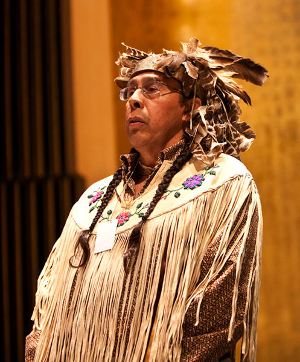
- Traditional Chief of the Onondaga Nation, Todadaho Sid Hill addresses the Ninth Session of the United Nations Permanent Forum on Indigenous Issues April 2010
By Broddi Sigurðarson
[CC-BY-SA-2.0], via Wikimedia Commons
I struggle to resolve my issue of wanting my ethnic neighbors to perpetuate their culture of origin so they can flourish in all their brilliance. I love the beauty of their traditional colors and symbols, perspectives and stories, and physical features.
In spite of this, I do not want to confine them to their ethnic roots.
On the one hand, I want people to be free to be whomever they want to be, even when that means that they choose to adopt others’ practices, and distance themselves from their own heritage. On the other hand, I am afraid that if people truly have this choice, cultures will die.
I don’t want any culture to die. Therefore, I have a hard time trusting that if we give all people the freedom and power to truly live their lives as they choose, some will continue their heritage. After all, no significant part of my identity seems to link with any of the cultures of my ancestry.
I feel free to choose from any cultures that attract me, as if I am at a banquet. I fill my plate from many choices. I choose offerings from the North, South, East and West. I choose offerings from ancient peoples and more-recently-formed cultures. I want everyone to freely choose from the table.
What do I contribute to the banquet? Nothing that you might recognize as being from my ancestors. Therefore, who am I to say that some people must bring something that reveals their superficial lineage instead of their deeper selves? I am simply a guest who certainly has no right to tell anyone what to offer. Nonetheless, I feel enormous disappointment when I realize that an item on the banquet table has disappeared.
Traditionalists see the damage caused by cultural exchanges, and work to protect their populations. My German and Greek ancestors formed closed communities, and continue to deliberately perpetuate their ways.
I see other possibilities, and encourage interaction. I want everyone to have access to the banquet, but I don’t want the interaction to dilute cultures. I wonder how we can balance this.
I venture to say that all cultures benefit – and are hurt by – the exchanges that occur during globalization. Perhaps simply valuing all contributions to the banquet minimizes damage, and perpetuates cultural freedom. When cultures blend, we improve each other.

Weave the fabric of this blog with your thoughts